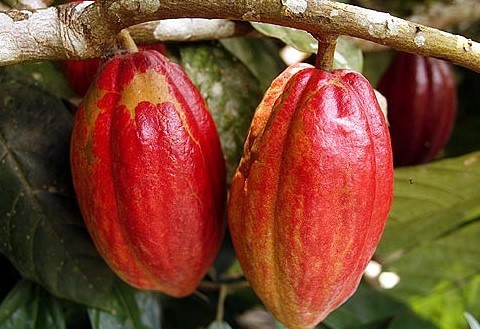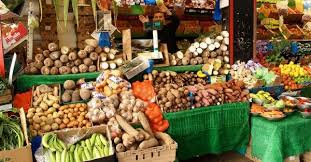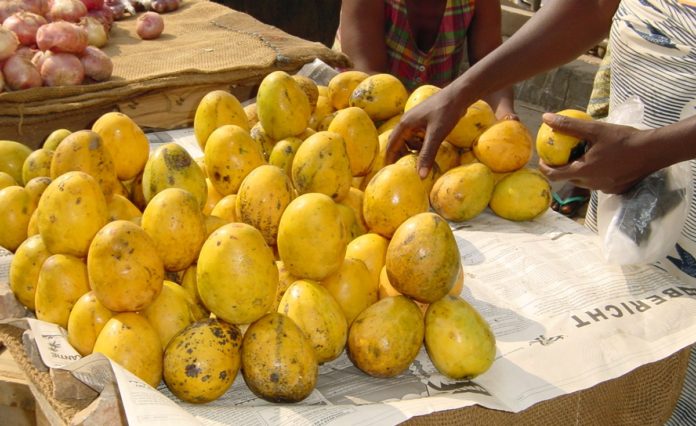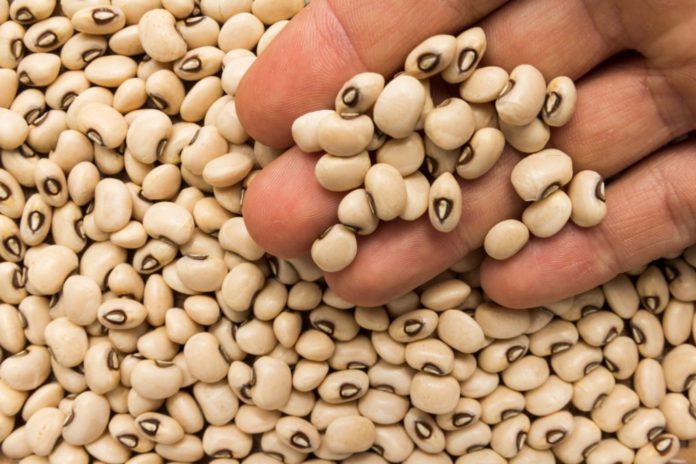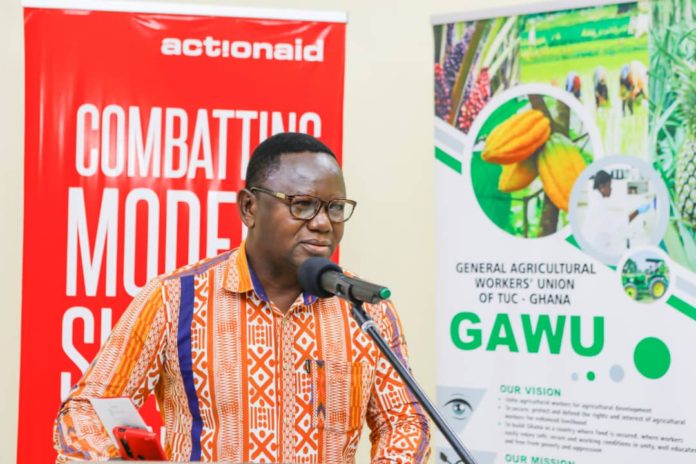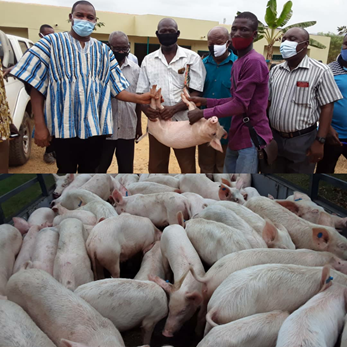The Council for Scientific and Industrial Research — Savanna Agricultural Research Institute (CSIR-SARI) has developed a technology to increase the yields of grain legumes, such as cowpea, Bambara bean groundnut, and soybean to ensure food security.
Cocoa production to fall by one-third – Report.
Cocoa production for the 2021/22 cocoa season has been forecasted to fall by one-third due to less conducive weather conditions and the outbreak of swollen shoot disease.
According to the International Cocoa Organisation’s (ICCO) monthly report for April 2022, the global 2021/22 cocoa market will fall into a deficit of 181,000MT from a surplus of 215,000 in 2020/21. Global 2021/22 cocoa production will fall by 5.2 percent year on year (y/y) to 4.955 MMT from a record 5.226 MMT in 2020/21.
“Available information on crop sizes in main cocoa origin countries of West Africa suggests that the 2021/22 cocoa season is heading toward a world deficit of approximately 181,000 tonnes mainly due to a shortfall in the Ghanaian production. Indeed, less conducive meteorological conditions and the outbreak of swollen shoot disease are the major contributing factors for the production decline,” the report said.
Reports by Reuters in April suggested that harsh weather conditions due to the harmattan winds are expected to reduce cocoa production in Ghana by at least 31 percent in 2021/22 from the season before. It further reported that country’s total production is projected not to exceed 710,000-720,000 tonnes this year, mainly because of a climate that has been catastrophic for cocoa.
Consequently, the swollen shoot disease outbreak could further deepen the woes already predicted.
Swollen shoot disease.
In late 2021, 43,281 cocoa trees affected by the swollen shoot disease were destroyed on 106.58 hectares of farmlands in the Dormaa Central Municipality of the Bono Region. The move was made proactively to avoid the disease spreading further.
This disease, according to COCOBOD, is estimated to have an infection rate of 20 percent of the country’s cocoa trees.
The cocoa farms in the Western North Region of the country have been the subject of rehabilitation under the National Cocoa Rehabilitation Programme (NCRP). These regions have been affected by the swollen shoot disease, which has had devastating effects on the country’s prime crop.
Approximately 11 percent of cocoa farms in the region, 51,537 hectares out of 487,386, have been rehabilitated under the programme so far. The NCRP was launched in 2017 by COCOBOD and financially supported by the African Development Bank (AFDB), with the objective of treating farms affected by the virus and replanting infected cocoa plants with disease-tolerant and early-bearing, high-yielding varieties.
As part of the programme, compensation is also to be paid to participating farmers and landowners for up to two years after the plantation.
Côte d’Ivoire cocoa production.
In Côte d’Ivoire, the 2021/22 cocoa production is also expected to be lower than the 2020/21 crop. As of May 1, 2022, cumulative arrivals of cocoa beans in the country were seen at 1.807 million tonnes; down by 3.2 percent compared to the volumes recorded in the same period of the previous cocoa year.
“Less supportive meteorological conditions can be cited as a cause of the expected lower production in Côte d’Ivoire,” ICCO said.
Fertiliser shortages: The poultry industry could suffer greater shocks, says Akufo-Addo.
President Akufo-Addo said the crisis in Ukraine has compromised the food security of Africa through the unavailability of fertiliser.
President Akufo-Addo has said the country’s poultry industry could suffer greater shocks from the feritliser shortages being experienced across Africa.
He said Ghana’s maize and soy production could be affected adding “our poultry industry could suffer greater shocks.”
Akufo-Addo said the growing concerns of fertiliser shortages across Africa including Ghana are very worrying.
The president sounded the alarm while opening the 22nd Academy of African Business and Development Conference (AABD) at the University of Professional Studies in Accra on Wednesday (18 May).
He said the crisis in Ukraine has compromised the food security of Africa not only by the disruption of commodity import but also by the unavailability of fertiliser for crops.
Clarion call.
Akufo-Addo said the current derangement in the global commodities market, supply chains and logistics should represent a clarion call for Africa to rise up and stand on her own feet.
He said Africans must, therefore, take advantage of the historic opportunity that the African Continental Free Trade Area (AfCFTA) presents as it provides both impetus and catalyst for much needed sustainable development adding that “the time to pursue the path of prosperity and self-respect for our nations and continent is now.”
Africa beyond aid.
Speaking on the theme: “Sustainable Development Beyond Aid: The Focus for Africa?” President Akufo-Addo said the concept of Africa beyond aid is about acknowledging that “we must develop in a sustainable manner “recognising that we must take the bull by the horn and take responsibility for our sustainable growth while pursuing our fellow African countries as key stakeholders in our own development.”
The African Business and Development Conference (AABD) is an annual conference aimed at facilitating multidisciplinary research by stimulating collaborations between Africa based researchers and professionals and their counterparts around the world by broadening and deepening global understanding of various issues relevant to Africa’s business and development, as well as advancing solutions to some of her challenges.
The conference which started on Tuesday (17 May) is expected to end on 21 May 2022.
The government instituted measures to strengthen food security by extending the temporary ban on grain exportation.
The government has extended the temporary ban on the exportation of grains including rice, maize, and soya beans.
The ban is to last for an additional six months effective April 1, to September 30, 2022.
“On account of this directive, consequential action is being taken to ensure strict enforcement at all Metropolitan, Municipal, and District Assemblies (MMDA’s),” the Ministry of Food and Agriculture (MoFA) said in a letter to the Ministry of Local Government, Decentralisation and Rural Development dated May 16, 2022.
MoFA further requested that the Local Government Ministry issue the required directives to MMDAs take the necessary action with the involvement of the District Security Councils (DISECs) to disseminate information and intensify the monitoring of trucks carting grains from market centers to neighbouring countries.
“We urge that prompt action is taken at all times with the involvement of the security agencies to give full effect to the directive of His Excellency the President,” the letter concluded.
The extension of the temporary ban on grains comes amidst the food shortage crisis as a result of the Ukraine war and a poor harvest season in the country.
It’s crazy to blame Russia and Ukraine for the hunger in Africa – Former President, Mahama.
The Former President, John Dramani Mahama has said it does not warrant blaming Russia and Ukraine for the hunger in Africa. This comment comes after the World Bank said the world is facing a “human catastrophe” from a food crisis arising from Russia’s invasion of Ukraine
Ghana to face severe hunger in Q1 2023, NDD warns.
Ghana is likely to face severe food shortages and hunger in the last quarter of 2022 and 2023, the Northern Development and Democratic Institute (NDDI), has said.
The NDDI explained there would be severe food shortages because the government was not heeding the global warning on the looming food crisis.
The Tamale-based premier liberal public policy think-tank revealed that the monstrous effects of COVID-19 on the global food supply chain and the entire global agriculture production targets were not completely waned.
It said the Russia-Ukraine war would adversely compound the food security challenges around the world, especially in countries within Sub-Sahara Africa, due to shortages in natural gas and fertiliser supplies.
The think-tank, in a press statement signed by its Executive Chairman, Mr. Mustapha Sanah, indicated that the Institute has conducted a snap pre-planting season assessment in 11 well known agriculture-advantaged districts in Northern Ghana between April 25 and May 12, 2022, which showed an acute shortage of fertiliser for smallholder farmers in Northern Ghana.
“In some instances, fertiliser companies are selling at higher prices outside the reach of smallholders, citing lack of government’s interest in paying their previous supplies,” MrSanah said.
He advised the government and the Ministry of Agriculture to re-assess the nation’s food security strategy and heed the global call for governments in Africa to invest more in agriculture, especially fertiliser.
The World Bank, International Monetary Fund, World Food Programme, and World Trade Organisation warned that the rise in food prices had been exacerbated by a dramatic increase in the cost of natural gas, a key ingredient of nitrogenous fertiliser.
Surging fertiliser prices along with significant cuts in global supplies have important implications for food production in most countries, including major producers and exporters, who rely heavily on fertiliser imports.
The increase in food prices and supply shocks can fuel social tensions in many of the affected countries, especially those that are already fragile or affected by conflicts.
Mr. Sanahsaid the NDDI “collated 42,240 views from 173 farmer-based organisations, 16,200 smallholder farmers, 13 agriculture mechanisation service providers, 18 agricultural extension officers, 108 women groups and 16 traditional authorities.”
He emphasised the need for the government to consolidate its flagship Planting for Food and Jobs programme by making efforts to ensure the availability of fertiliser to all farmers.
“The Ministry of Agriculture and the government should delay no further in making payment to importers and fertilizer companies to ensure availability of subsidised fertiliser in the market. This preventive measure will ultimately mitigate the crisis when food shortages arise,” he said.
Mr. Sanah urged the international community and the country’s development partners to support the government of Ghana to pay fertiliser companies monies owed them by the government to pave way for new supplies into the market.
“We call on the international community especially the World Bank, IMF, WFP and WTO, EU and UN agencies, and all our development partners to hasten steps to support the government of Ghana to provide fertiliser to smallholder farmers in Ghana,” he stressed.
LIFESTYLE: Mango Season; the volume of mango that people with diabetes must eat per day.
There is no denying that the calories in mangoes that come from sugar may contribute to the increased blood sugar in diabetic people.
Efforts are underway to ensure approval for Ghana’s first GMO crop.
Senior Research Scientist at the Savannah Agricultural Research Institute (SARI) of the Council for Scientific and Industrial Research (CSIR) Dr. Jerry Nboyine explained efforts are underway to ensure approval for Ghana’s first GMO crop, the pod borer resistant (PBR) cowpea.
This was revealed at a four-day workshop themed, Speaking Science Ghana, which brought together senior and junior scientists with academic institutions and research organisations across the country for training on best practices in science communication.
The GM cowpea has been developed to resist the deadly pod borer which could cause up to 100% crop yield loss on farms. “With PBR Cowpea, farmers can attain the potential yields of most commercially released cowpea varieties which is about 2 tonnes per hectare. This is about a four-fold yield increment over existing yields,” he explained.
He said approval of the variety will help ensure “protection of our environment from hazardous insecticides, protection of cowpea farmers from pesticide poisoning, and protection of consumers from pesticide poisoning.”
“With GM cowpea, Ghana can attain food sufficiency in the area of cowpea production. Nigeria has commercialised PBR Cowpea and will soon export grains to Ghana informally. Our market women will buy cowpea from Nigeria and there is no guarantee that some PBR Cowpea will not be included in what is brought into Ghana,” he observed.
Dr. Maxwell Darko Asante who is Deputy Director of the Crop Research Institute of the CSIR also told the participants Ghana is additionally developing a GM rice (NEWEST rice).
He said the GM rice being developed uses nitrogen efficiently, uses water efficiently, and has salt tolerance.
“The lead Nitrogen – Use Efficient lines have a yield advantage of 15-30% compared to the non-GM version on nitrogen-deficient soils,” he explained.
He said if this crop gets adopted, resource-poor farmers who cannot afford the recommended levels of fertilizer can still have good yields.
This will improve livelihoods, mitigate the effects of climate change, as well as help ensure marginal areas which cannot support rice production, could be cultivated.
Participants’ reaction
Research scientist at BNARI Dr. Elaine Azu who participated in the science communication training said it has equipped her with the appropriate tools to communicate about science and technology’s role in agricultural production.
“Now I have the skills to be able to go out there… It’s time for the public to know what scientists are doing in the lab. To my fellow scientists, step out, and let people know how science can contribute to the development of Ghana,” she said.
Sandra Nsoh who is a teaching assistant at the Department of Biotechnology at the University for Development Studies told the media she learned a lot from the workshop.
“I am a very good speaker, but this training has really sharpened my communication skills. One speaker said the new generation of scientists should be active on social media platforms. I intend to wake myself up and speak more about science,” she said
There will be starvation without an import for a month. – Kareweh.
The General Secretary of the Ghana Agricultural Workers Union, Mr. Edward Kareweh, has said that Ghana does not have enough food available to feed the people for even one month without an import.
Pig farmers attribute the hike in the price of pork to the high cost of feed.
The Pig Farmers Association of Ghana is attributing the recent increase in the price of pork to the increase in feed and other factors.


